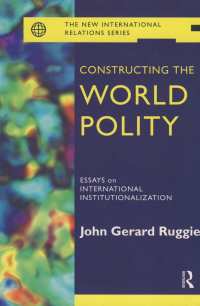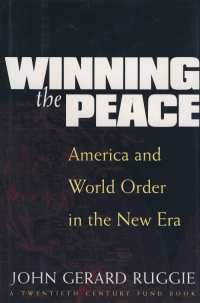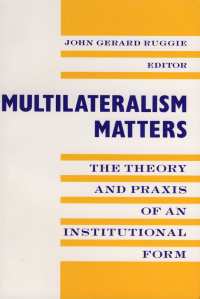

John Gerard Ruggie
*18.10.1944 in Graz
Österreichisch-US-amerikanischer Politikwissenschaftler, Professor für Internationale Beziehungen, Menschen- und Völkerrecht an der Harvard University, Kennedy School of Government, UN-Sonderbeauftragter für Menschenrechte und transnationale Unternehmen, Vertreter des neoliberalen Institutionalismus., Regimetheoretiker, Konstruktivist, einer der einflussreichsten amerikanischen Politikwissenschaftler der liberalen Richtung; Politikberater von Kofi Annan.
Werdegang
geboren am 18.10.1944 als Sohn von Josef und Margaret Ruggie in Graz, Steiermark
als Kind Emigration in die USA
1967 B.A. (Politikwissenschaft und Geschichte), McMaster University, Kanada
1968 M.A. (Politikwissenschaft), University of California, Berkeley
1974 Ph.D. (Politikwissenschaft), University of California, Berkeley
1973 - 1978 (Acting) Assistant Professor of Political Science, University of California, Berkeley
1974 -1977 Visiting Research Fellow, The Royal Institute of International Affairs, London
1978 - 1983 Associate Professor of Political Science, Columbia University, New York
1983 - 1987/ 1991- 1996 Professor of Political Science, Columbia University, New York
1987 - 1991 Professor of International Relations and Pacific Studies, University of California, San Diego
1989 - 1991: Director, University of California, Institute on Global Conflict and Cooperation
1991 - 1996 Dean, School of International and Public Affairs, Columbia University
1996 - 2001: Burgess Professor of Political Science, James T. Shotwell Professor of International Relations, Columbia University
1997 - 2001 Assistant Secretary-General, Senior Adviser for Strategic Planning to the Secretary-General, United Nations, New York
2005 Berthold Beitz Professor in Human Rights and International Affairs, Havard's Kennedy School of Government; Affiliated Professor in International Legal Studies, Harvard Law School
2005-2011 Special Representative of the United Nations Secretary-General for Business and Human Rights
Dezember 2008 Ruggie-Bericht der UNO zur Menschenrechtsverantwortung von Multinationalen Unternehmen
Mitgliedschaften
1980, 1992: Program Committee, American Political Science Association, Annual Meeting
1983- 1988: United Nations Association of the United States of America, Board of Governors
1986- 1987/ 1998-2001: Board of Education, Bronxville, New York/ International Advisory Committee, Ritsumeikan Asia Pacific University (Japan)
seit 1988 National Council
seit 1990: Council on Foreign Relations
1992- 1995: Foreign Policy Association, Board of Governors
1993- 1996: Board of Directors, The Academic Council on the United Nations System
1995/ 1996: Secretary-Treasurer and President-Elect, Association of Professional Schools of International Affairs , Association of Professional Schools of International Affairs / President
1996- 1997: Fellow, Center for Advanced Study in the Behavioral Sciences, Stanford
1996- 1998: Council, American Political Science Association
seit 1999 American Academy of Arts & Sciences
seit 2001: Advisory Council, Stanley Foundation
2002- 2005: Secretary-General’s Advisory Council on the Global Compact, United Nations
Auszeichnungen
1999: Distinguished Scholar Award, International Studies Association
2000: Doctor of Laws (Honoris Causa), McMaster University, Canada
2000: Hubert H. Humphrey Award for Outstanding Public Service, American Political Science Association
Primärliteratur
Bücher
Constructing the World Polity: Essays on International Institutionalization. London and New York: Routledge 1998.
Winning the Peace: America and World Order in the New Era. New York: Columbia University Press 1996.


Herausgeber
Embedding Global Markets: An Enduring Challenge. Hampshire: Ashgate 2008.
Multilateralism Matters: The Theory and Praxis of an Institutional Form. New York: Columbia University Press 1993.

mit Jagdish Bhagwati, Passions, and Purpose: Prospects for North-South Negotiations. Cambridge, Mass.: MIT Press 1984.
The Antinomies of Interdependence: National Welfare and the International Division of Labor. New York: Columbia University Press 1983.
mit Ernst B. Haas, International Responses to Technology: Regimes, Institutions and Technocrats, issue of International Organization 29.1975, 3. S. 557-920. (=Auftaktband zur Regimetheorie)
Aufsätze
Collective Goods and Future International Collaboration. In: American Political Science Review 66.1972, 3. S. 874-893.
The Structure of International Organization: Contingency, Complexity and Postmodern Form. In: Papers, Peace Research Society (International) 18.1972.
mit Ernst B. Haas: International Technology and International Action. In: Skolnikoff, Eugene B. (Hrsg.): Priority Research on Technology-Related Transnational and Global Policy Problems. Cambridge: MIT 1973.
Contingencies, Constraints, and Collective Security: Perspectives on UN Involvement in International Disputes. In: International Organization 28.1974, 3. S. 493-520.
Complexity, Planning and Public Order. In: LaPorte, Todd R (Hrsg.): Organized Social Complexity. Princeton: Princeton University Press 1975.
International Responses to Technology: Concepts and Trends. In: International Organization 29.1975, 3. S.557-583.
mit Branislav Gosovic, On the Creation of a New International Economic Order Issue Linkage and the Seventh Special Session of the UN General Assembly. In: International Organization: 30.1976, 2. S. 309-345.
mit Branislav Gosovic, The 'New International Economic Order': Origins and Evolution of the Concept. In: International Social Science Journal 28.1976.
Changing Frameworks of International Collective Behavior: On the Complementarity of Contradictory Tendencies. In: Choucri, Nazli/ Robinson, Thomas (Hrsg.) : Forecasting in International Relations. San Francisco: W. H. Freeman 1978.
On the Problem of 'The Global Problematique': What Roles for International Organizations?. In: Alternatives 5.1980, 1.
mit Ernst B. Haas, Information Exchange and International Change: The Case of INFOTERRA. In: International Relations. 7.1981, May.
International Regimes, Transactions, and Change: Embedded Liberalism in the Postwar Economic Order. In: International Organization 36.1982, 2. S. 379-415.
mit Ernst B. Haas: What Message in the Medium of Information Systems? In: International Studies Quarterly 26.1982, 2. S. 190-219.
Continuity and Transformation in the World Polity: Toward a Neorealist Synthesis. In: World Politics 35.1983, 2. S. 261-285.
Human Rights and the Future International Community. In: Daedalus 112.1983, Fall.
Social Time and International Policy: Conceptualizing Global Population and Resource Issues. In: Karns, Margaret P. (Hrsg.): Persistent Patterns and Emergent Structures in a Waning Century. New York: Praeger 1986.
mit Friedrich Kratochwil, International Organization: A State of the Art on an Art of the State. In: International Organization 40.1986, 4. S. 753-775.
mit David Leyton Brown, The North American Political Economy in the Global Context: An Analytical Framework. In: International Journal 42.1986/87, Winter.
International Structure and International Transformation: Space, Time and Method. In: Rosenau, James N./ Czempiel, Ernst-Otto (Hrsg.): Global Changes and Theoretical Challenges. Lexington: MA: Lexington Books 1989.
Embedded Liberalism Revisited: Institutions and Progress in International Economic Relations. In: Adler, Emanuel/ Crawford, Beverly (Hrsg.): Progress in Postwar International Relations. New York: Columbia University Press 1991.
Multilateralism: The Anatomy of an Institution. In: International Organization 46.1992, 3. S.561-598.
Unravelling Trade: Global Institutional Change and the Pacific Economy. In: Higgott, Richard / Leaver, Richard/ Ravenhill, John (Hrsg.): Pacific Economic Relations in the 1990s: Cooperation or Conflict?. Sydney, Allen and Unwin 1993.
Territoriality and Beyond: Problematizing Modernity in International Relations. In: International Organization 47.1993, 1. S.139-174.
Third Try at World Order? America and Multilateralism After the Cold War. In: Political Science Quarterly 109.1994, Fall.
The False Premise of Realism. In: International Security 20.1995, 1. S. 42-70.
At Home Abroad, Abroad At Home: International Liberalization and Domestic Stability in the New World Economy. In: Millennium: Journal of International Studies 24.1995, 3. S. 507-526.
Peace in Our Time? Causality, Social Facts, and Narrative Knowing. In: American Society of International Law, Proceedings 89.1995.
The Past as Prologue? Interests, Identity, and American Foreign Policy. In: International Security 21.1997, 4. S.89-125.
Globalisierung und der gesellschaftliche Kompromiß des sozial regulierten Liberalismus: Das Ende einer Ära? In: Jahrbuch Arbeit + Technik 1997. S. 369-382.
What Makes the World Hang Together? Neo-utilitarianism and the Social Constructivist Challenge. In: International Organization 52.1998, 4. S. 855-885.
mit Georg Kell, Global Markets and Social Legitimacy: The Case of the Global Compact. In: Transnational Corporations 8.1999, December.
The Theory and Practice of Learning Networks: Corporate Social Responsibility and the Global Compact. In: Journal of Corporate Citizenship 5.2002, Spring.
Trade, Sustainability and Global Governance. In: Columbia Journal of Environmental Law 27.2002, 2.
Taking Embedded Liberalism Global: The Corporate Connection. In: Held, David/ Koenig-Archibugi, Mathias (Hrsg.): Taming Globalization: Frontiers of Governance. Cambridge: Polity Press 2003.
The United Nations and Globalization: Patterns and Limits of Institutional Adaptation. In: Global Governance 9.2003, 3. S. 301-321.
Reconstituting the Global Public Domain: Issues, Actors and Practices. In: European Journal of International Relations 10.2004, 4. S. 499-531.
mit Katzenstein, Peter J. / Keohane, Robert O./ Schmitter, Philippe C., Transformations in World Politics: The Intellectual Contributions of Ernst B. Haas. In: Annual Review of Political Science 8.2005.
American Exceptionalism, Exemptionalism and Global Governance. In: Ignatieff, Michael (Hrsg.): American Exceptionalism and Human Rights. Princeton: Princeton University Press 2005.
Doctrinal Unilateralism and its Limits: America and Global Governance in the New Century. In: Forsythe, David P./ McMahon, Patrice C. / Wedeman, Andrew (Hrsg.): American Foreign Policy in a Globalized World. New York: Routledge 2006.
Global Markets and Global Governance: The Prospects for Convergence. In: Bernstein, Stephen/ Pauly, Louis W. (Hrsg.): Global Governance: Towards a New Grand Compromise?. Albany: State University Press of New York 2007
Business and Human Rights: The Evolving International Agenda. In: American Journal of International Law.
Current Developments,"Business and Human Rights: The Evolving International Agenda" . In: American Journal of Internation Law, 101 October 2007.
Weblinks
persönliche Website: http://www.hks.harvard.edu/m-rcbg/johnruggie/index.html
http://www.getcited.org/mbrz/10017313
HN